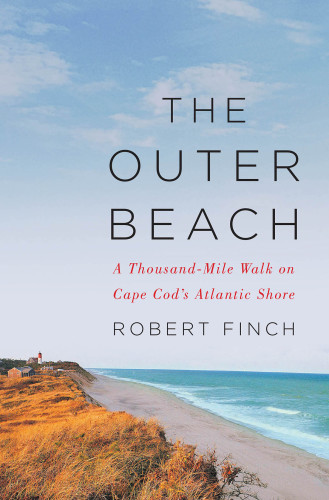
The Outer Beach
A Thousand-Mile Walk on Cape Cod's Atlantic Shore
- اطلاعات
- نقد و بررسی
- دیدگاه کاربران
نقد و بررسی

February 27, 2017
One of the world’s most fragile and evanescent landscapes furnishes enduring life lessons in this collection of atmospheric ecological meditations. Naturalist Finch (The Iambics of Newfoundland: Notes from an Unknown Shore) reckons that during his 40-odd years living on Cape Cod he took some 1,000 miles worth of strolls up and down its sweep of ocean-facing beach, and recounts many of those strolls in these essays. In rich and subtle detail, his portraits of the beach capture its ever-shifting elements: the myriad tempos of wind and surf, sudden incursions of fog, intricate tidal currents, swarms of shore birds, detritus thrown up briefly and then swallowed up again by the waves, even the tiny flows of sand trickling down the seaside bluffs. It must be said that after very many such sketches of surf, fog, birds, flotsam, and sand, this palette of effects starts to exhaust its expressive potential, and the reader is relieved by the appearance of more dramatic and singular figures and events, including shipwrecks, beached whales, the destruction of cottages and other buildings by storm-tossed seas. As the ocean ceaselessy gnaws away the Outer Beach, Finch draws lessons on the impermanence of life from this settlement built on sand, lessons that resonate with his evocative panorama of restive natural forces in an iconic setting.

Starred review from March 15, 2017
Lyrical reflections, natural history, and nuggets of wisdom inspired by walks at the shore.In 40 years of walking along Cape Cod's Outer Beach, Finch (Cape Cod Notebook 2, 2016, etc.) estimates that he has covered 1,000 miles, rambles that have informed nine previous books. In his latest collection, he chronicles his beach walking from south to north along the Cape's 40-mile stretch of glacial bluffs, barrier beach, and islands. The author chose John Keats' remark, -Description is always bad,- as an epigraph for the book, but that comment surely does not apply to the precision and sheer loveliness of Finch's prose. One night, walking through fog, he could barely see the surf but suddenly smelled the ocean, -rich, salt spiced, redolent of fecundity and decay.- Under moonlight, the waves -came in silhouette, low black forms, like great fish swirling in on the moon-crusted surface of the sea.- Like the surfers he enjoys watching, Finch has learned to read waves, -each with its own distinct shape, height, alignment, speed, curl.- Each wave -speaks its own watery sentence, which the surfer has to parse.- The author reflects often on change and time. -The more mobile we become,- he suggests, -the more immobile we demand nature to be.- But the shore is in constant, repetitive flux: -The Cape's outer shores are a solid metaphor for the river of time, into which we can step only once.- Finch once brought a distraught friend to the shore, hoping to help him discover -the need to adapt continually to change, always to be watching for undertows and rogue waves, to dance nimbly along its edges.- His friend returned to the solidity of hills; Finch found -solace and reassurance from the beach.- Even without the possible rise in sea level because of climate change, scientists estimate that the Cape will be eroded in 6,000 years. Nature, Finch knows, is more powerful than human intervention, and it is this power than enthralls him. Vivid and graceful reflections on water and wind, shifting sands, and the inevitability of change.
COPYRIGHT(2017) Kirkus Reviews, ALL RIGHTS RESERVED.

March 15, 2017
Nature writer and NPR correspondent Finch is quick to deny the validity of his book's subtitle; readers will note, too, that this isn't a guide for Cape Cod walkers. Instead, it's a love letter to life on the Cape spanning his 40 years walking "the back side of Cape Cod" via a series of episodes--some only a long paragraph, others filling pages. Finch arranges his time on the Cape by location, beginning in the South of the Outer Beaches, and, following in chronological order, from the early 1960s to the present. The lack of illustrations or photographs may disappoint readers unfamiliar with the area, while a map at the beginning means a fair amount of page flipping. A master stylist, Finch is both a naturalist and philosopher. A 1977 essay titled "The Cape as a River of Time" illustrates the charm of his prose: "Thoreau's beach--or most of it, or the site where it was--is more than a hundred yards out to sea. The Cape's outer shores are a solid metaphor for the river of time, into which we can step only once." VERDICT This beautiful book is to be savored in small bites by anyone yet to visit the Cape, and swallowed whole by those who love it as much as Finch does.--Janet N. Ross, formerly with Washoe Cty. Lib. Sys., Sparks, NV
Copyright 2017 Library Journal, LLC Used with permission.




دیدگاه کاربران